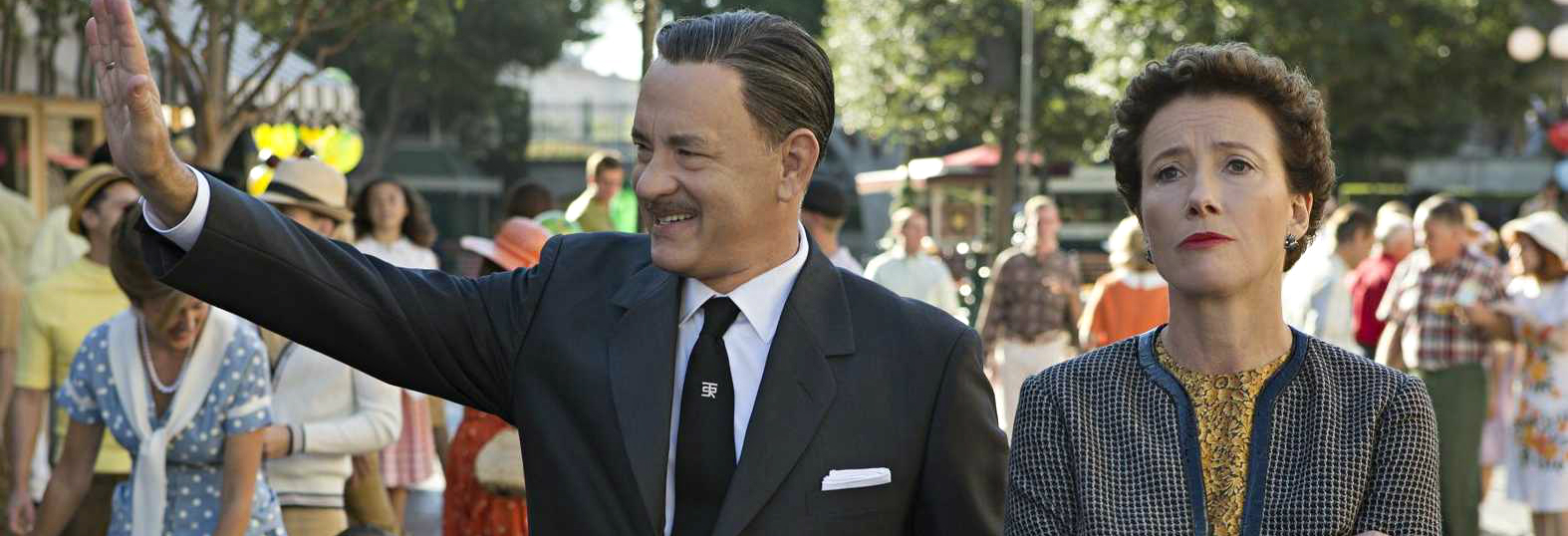[Editor’s Note: Today, we welcome our newest contributor to The Bonus View. Phil Brown has joined us to cover some theatrical releases and other topics, starting with a review of ‘Saving Mr. Banks’. Please give him a warm welcome. –JZ]
No industry enjoys patting itself on the back more than Hollywood, and no studio enjoys nostalgia quite as much as Disney. So, it should come as no surprise that the company’s big fluffy Oscar contender, ‘Saving Mr. Banks’, arrives packed with both qualities. Thankfully, the whole project is saved by a big heaping of Disney magic. Oh sure, the cynical left side of your brain might snicker and sniff as the film pulls heartstrings and triggers childhood memories with ruthless precision. Yet, ultimately, the right side with giggle and well up when all the expected beats out play because, well, they work. The Disney empire continues to cast a Mickey Mouse-shaped shadow over the entertainment industry for a reason. It may not be the most inventive backlot in the Hollywood Hills these days, but its formulas still work.
The movie itself is about a prickly Brit as skeptical with the House of Mouse as any adult 2013 viewer. She is the equally imaginative and cantankerous P.L. Travers (Emma Thompson, playing stuffy Britishness to perfection), whose ‘Mary Poppins’ novels delighted children worldwide, none more so than the daughters of Walt Disney (Tom Hanks, who was probably destined to play the role eventually). Travers resisted Disney’s attempts to transform ‘Poppins’ into candy-colored Disney spectacle for years before financial woes finally led to her relenting.
As the story begins, she travels to Los Angeles, where Disney plans to wow her with his chutzpah, charm and theme park, in between rounds of creative meetings with screenwriter Don DaGradi (Bradley Whitford) and composers Richard and Robert Sherman (Jason Schwartzman and B.J. Novak). Travers has script approval and doesn’t take too kindly to the Disneyfication process, almost disastrously so. She whines and moans and refuses to have any fun at all, dammit! Walt just can’t seem to crack her English nut, until she gets particularly frustrated by the treatment of the seemingly incidental father character, Mr. Banks. Wouldn’t ya know it? The film is also filled with sentimental flashback material about Travers’ own father, whose alcoholism and Colin Farrell stunt casting guarantee to offer the secret to Travers’ uptight resistance to Disney.
The plot handed to ‘The Blind Side‘ director John Lee Hancock sounds like it’s filled with all of the hokey tear-jerkery that you’d fear from a film like this, and indeed it’s all there. (I didn’t even mention Paul Giamatti’s sunny limo driver assigned to perk up Thompson every morning, who also secretly has a disabled daughter.) Yet, much like Hancock managed in his last Best Picture nominee, he gleefully whips up cotton candy Hollywood fantasy into a fairy tale that teaches us all a message on the way to a happy ending without feeling cheap. It’s not high art by any means, but it certainly does the job.
You’ve almost got to admire the unapologetic corporate synergy of Disney releasing a film that not only honors ‘Mary Poppins’ in time for its 50th anniversary Blu-ray release, but also features a climatic trip to Disney Land that presents the park as the happiest place on Earth. This would all be nauseating were it not for the fact that those ‘Mary Poppins’ tunes retain a delightfully buoyant and undeniably catchy quality all these years later. The music supposed to win over Travers is genuinely transcendent, and when presented by a charmingly funny trio like Whitford, Novack and Schwartzman, it’s a joy to behold. Though the flashback sequences can be tough to endure thanks to a miscast Farrell, they build towards a surprisingly resonant connection with the ‘Mary Poppins’ film that casts a timeless classic into a new light just in time for a tearful finale (both for Travers and the audience).
Hancock pulls off the film, both because he’s unapologetic about his old-fashioned feel-good storytelling and because there’s actually an interesting slice of Hollywood history worth feeling good about crammed in there. Sure, plenty of facts get fudged to create a more balanced narrative arc (a fake dramatic meeting between Walt and Travers here, an exaggerated emotional outburst at the ‘Mary Poppins’ premiere there), but that’s to be expected in this type of film. The layers of gloss in the presentation make the fantasy clear before those scenes arrive.
In the end, ‘Saving Mr. Banks’ is as sweet and charming as the idea of Tom Hanks playing Walt Disney would suggest, and both the film and stunt-casting deliver. Yet despite all that, the reason the film will work for a wider crowd than the usual bio-cheese comes down to one person: Emma Thompson. Her prickly portrayal offers a welcome injection of emotionally restrained British humor from start to finish. It’s a delightful comedic turn from the actress and a perfect narrative device. By having Thompson’s sly wit undercut all the attempts at Disney sentimentality early on, the cynics in the audience will feel represented on screen, until Thompson’s performance and character gradually pull them into the inevitable well of tears without realizing it. Consider it a little medicine slipped into the sugar and exactly what was needed to turn Disney schmaltz into Disney magic. Walt Disney would be proud, even if P.L. Travers would be horrified. Considering how their actual history played out, that’s probably appropriate.
Rating: 








Josh Zyber
So this isn’t a sequel to Saving Private Ryan? Disappointed. 🙁
Timcharger
Josh, you really, really wanted to title this blog with a pun to Saving Private Ryan, didn’t ya?
Josh Zyber
I really did. Couldn’t think of a good one, though.
EM
“Saving Private, Wry Anguish”?
Oh, wait, you said a good one…
John Smith
WALT WAS THE GREATEST GENIUS THE WORLD NEVER KNEW
MORE OSCARS THAN ANYONE.
Julian
But the world did know Walt Disney. In fact, we still know him and we still talk about him!